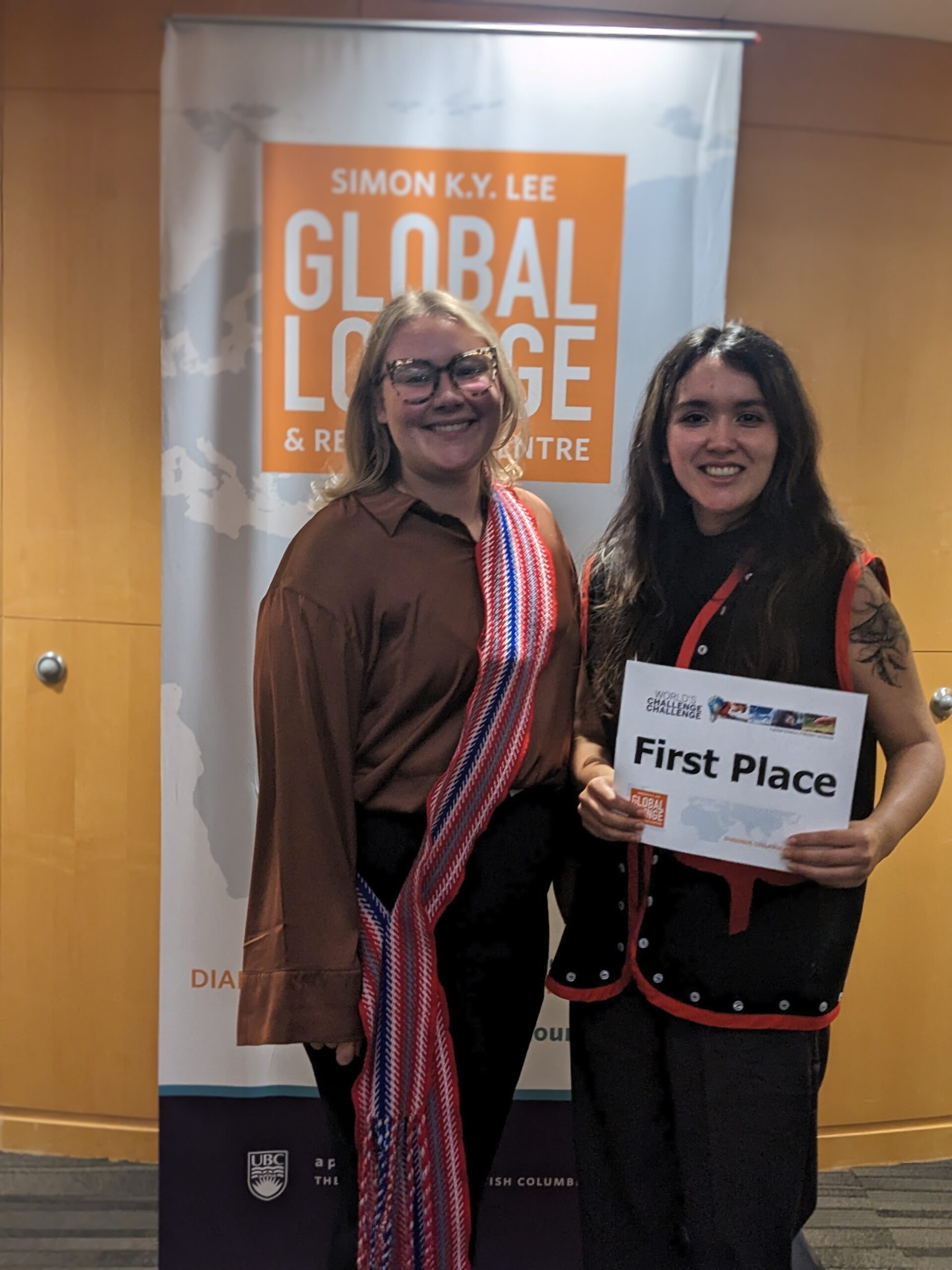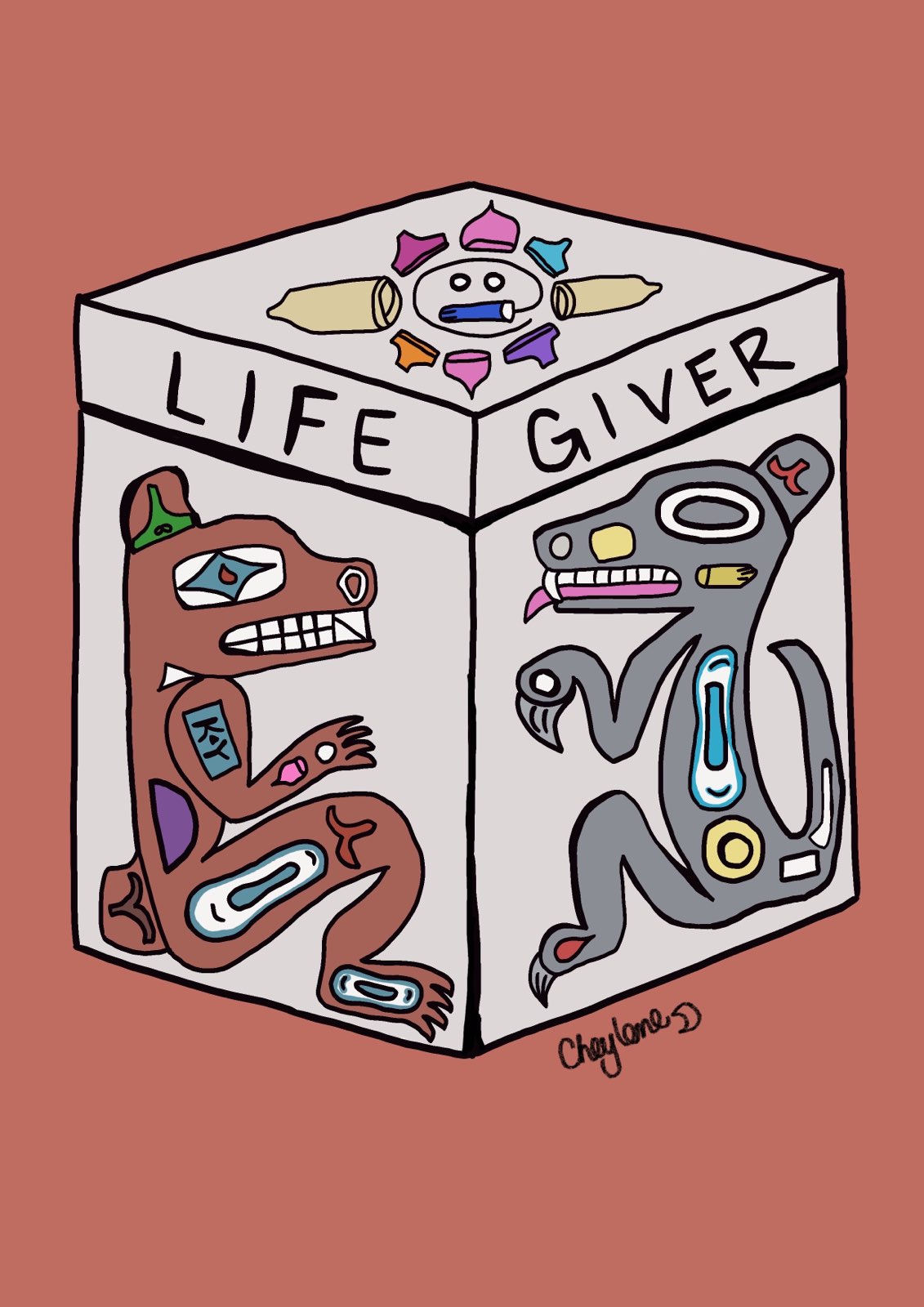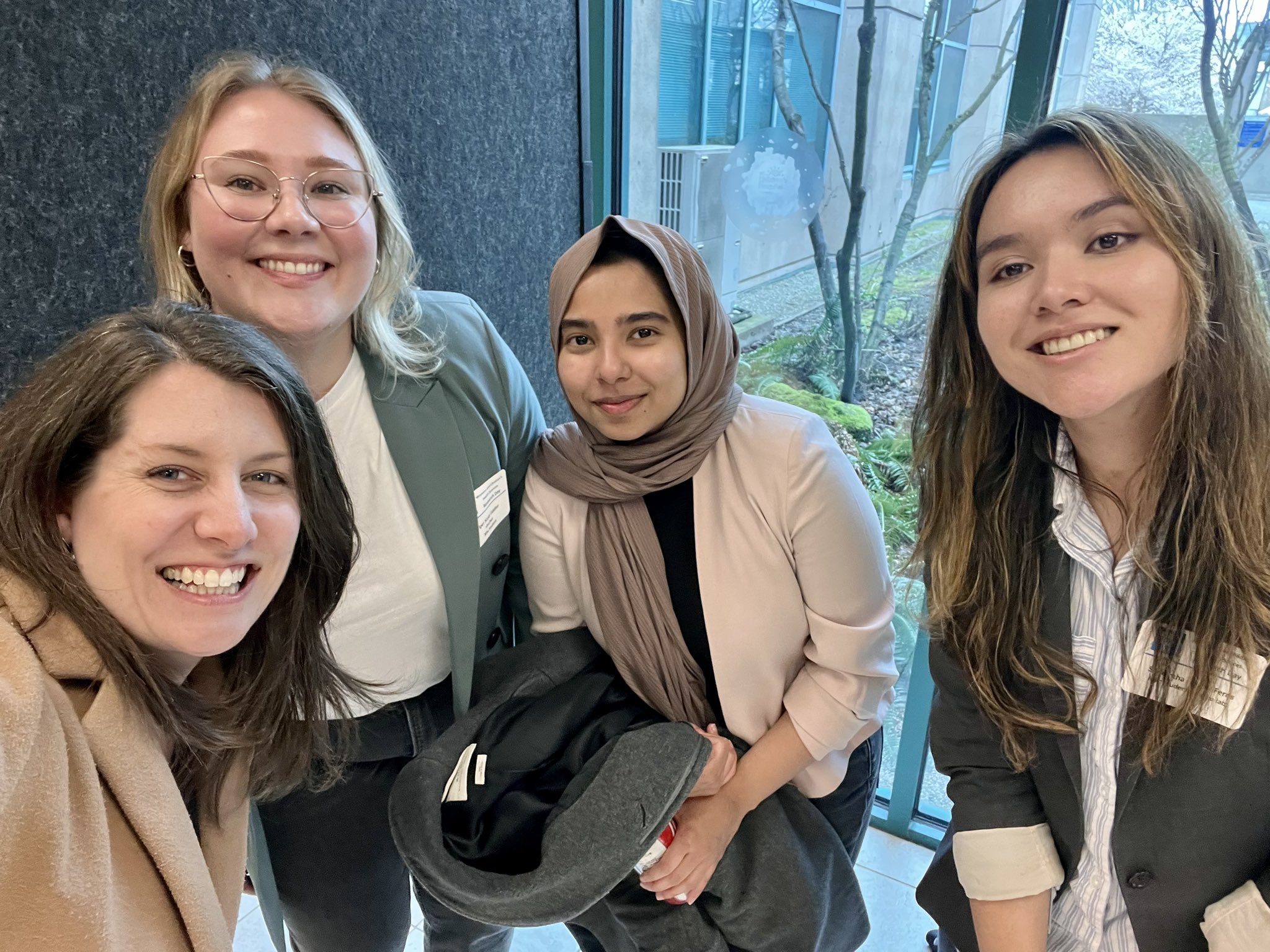The saying ‘necessity is the mother of invention’ rings true for Advancing Health Trainees Piper Scott-Fiddler and Samantha Martin-Ferris as they saw an urgent need for access to culturally appropriate sexual health care in their Indigenous communities. The invention came as part of the World’s Challenge Challenge, an international competition where students develop and pitch a solution with a global impact.
The pair was inspired by the LifeStraw, a life-saving water purification product available worldwide that was originally conceived as part of the Challenge in the 1990s. Piper, a member of Métis Nation of B.C., was recalling the origins of the idea, when Samantha said “Imagine doing something like the LifeStraw, but with sexual health products.”

“We both place a lot of value in sexual and reproductive health and promoting self-determination among Indigenous communities,” explained Piper.
More specifically, Samantha notes that the Lifegiver Box was developed as an answer to the calls to action against the systemic erasure of Indigenous bodies in the sexual health care landscape, particularly as a response to the recent 2022 Senate report The Scars That We Carry.
“The report not only acknowledged that some Indigenous women are still being forcibly sterilized but that more needs to be done by health care professionals to meet the needs of Indigenous people in the sexual health care field,” said Samantha, who hails from Gitksan Nation in northern B.C. “As an Indigenous woman, this is a very important project as a means of giving back to Indigenous communities, as well as providing a way of ending systemic harm against Indigenous bodies.”
Both Piper and Samantha are Master’s students in the UBC Faculty of Medicine’s WACH (Women+ and Children’s Health) program where they are supervised by Advancing Health Program Head of Knowledge Translation Dr. Sarah Munro.
With additional mentorship from Dr. Unjali Malhotra, Women’s Health Medical Officer at the First Nations Health Authority (FNHA), they developed a low-cost toolkit to promote culturally safe sexual health and wellness.
In early March, Piper and Samantha pitched their idea to a panel of judges in the UBC leg of the Challenge. The pair was awarded first place for their innovation and will now present at the virtual International World’s Challenge at Western University in June for a chance to win $30,000 for their project.
What’s in the box? Focusing on cultural wellness and accessible products
“The Lifegiver Box is a complementary, interdisciplinary, and culturally inclusive program that supports Indigenous people’s rights to health by choosing their own needs for their sexual health journey,” they wrote in their pitch to the judges at UBC. But what does that look like in practice?
The pair originally wanted to create an all-in-one pharmacy for remote Indigenous communities but after initial talks with FNHA, the students decided the box instead could focus on low-barrier, low-cost options that could be focused on cultural components.
“This is because Indigenous communities having access to medical supplies is only half the battle. There may be a hesitancy to engage in medical care due to past issues of colonial practice,” said Samantha. “Because of this we decided to engage with the concept of ‘Lifegiving’; instead of just being focused on sexual health, it follows a person’s journey from puberty through to how they engage with their gender and identity, to their choices with family planning.”

The Box contains sexual health products, Indigenous cultural wellness items, and knowledge translation tools about sexual health and gender identity. The sexual health products in the box include levonorgestrel (Plan B), period products, pregnancy tests, and contraceptives, among other items.
The cultural wellness items contained in the box are dependent on the needs of the communities that participate in the program.
“It’s not a pan-Indigenous box. Each box will be developed in consultation with local knowledge keepers and Elders to ensure the box has whatever kind of products they want,” said Piper. “This distinctions-based approach is key; it acknowledges that each community and population have different histories, cultures, and needs.”
Depending on those needs, boxes may include medicines like teas and herbs used to alleviate menstrual pain, as well as materials communities use to smudge and cleanse themselves.
Samantha also notes that the Lifegiver Project, which was recently profiled by FNHA, takes a strengths-based approach. “This approach allows Indigenous people the right to choose which products they access, as well as for communities to give feedback on what they want to see in the box,” explained Samantha.
Just as the content of each box is dependent on the needs and values of each community, the physical form of each box can be adapted as needed.
“It doesn’t necessarily have to be a box,” said Piper. “We want to make this as flexible as possible, both in form and function.”
The box could appear in a central location in a community or take the form of a lending library in an accessible area. Another proposal is to use a weatherproof vending machine system.
“The Gitksan community where I’m from is piloting the first-ever harm-reduction vending machine,” said Samantha. “They’ve extended the lovely option of including the Lifegiver Box in this process.”
For Piper and Samantha, the physical manifestation of these boxes is as important as their contents.
“They can be fully designed by an Indigenous artist of the community’s choice, or by the community themselves,” said Piper. “Our proposed budget provides the supplies to make this box beautiful, make it represent their community, and bring back that community-centered way of sexual health.”
“The intent is that Indigenous communities will see themselves reflected in these boxes,” added Samantha. “In the future, I’m sure we’re going to see a variety of requests for the size, location, materials, and art incorporated into these boxes and that’s what makes them so exciting!”
Scaling up and expanding access to sexual health care
Piper and Samantha’s goal is to create a sustainable and low-cost program that can reach a large population. The work also fits within Dr. Munro’s larger Story Project, which aims to improve access to family planning care for Indigenous people in B.C.
“Part of the integrated knowledge translation for the Story Project has been partnering with FNHA,” said Dr. Munro. “What we’re learning through this process is that there is a need for different approaches to bridge gaps in access to family planning care.”
Finding creative and unique ways to improve access to care is what the Lifegiver Box is all about.

“This Lifegiver Project is something that is incredibly community driven and it’s an opportunity to engage in applied knowledge translation while we’re gathering data through research,” explained Dr. Munro. “As we’re supporting Sam and Piper in this initiative, we can also discuss research questions with health care professionals and Indigenous clients. For example: What are the features that they would like to see in a tool of this nature?”
As part of the Story Project, Dr. Munro and her team are heading to Hazelton and the surrounding region this spring to meet with health care professionals and discuss health services access.
“The questions that we ask during these meetings are now going to be tailored to what we’ve learned around the development of the Lifegiver Box,” said Dr. Munro.
While the Lifegiver Project has begun as a pilot, the team is focused on sustainability and longevity, aiming to develop compelling data for future funding opportunities in order to provide much-needed access to sexual health care.
“I’m a proud Metis woman. My parents really instilled in me the importance of making your own choices in your sexual health, and that how you decide to use your body and love your body is up to you,” said Piper. “Being able to be part of a project where sexual health and self-determination is promoted is very exciting.”
“I believe this is a very powerful project as it creates space between health care practitioners and Indigenous communities to discuss what they need to decide their own journeys in their sexual health and reclaim that space,” said Samantha. “As an Indigenous woman I’ve been happy to discuss with my own Elders what the process of Lifegiving looks like to them and I’m greatly appreciative of being able to participate in this knowledge sharing process.”
Piper and Samantha presented their work as part of the Advancing Health Trainee Seminar on May 5.



